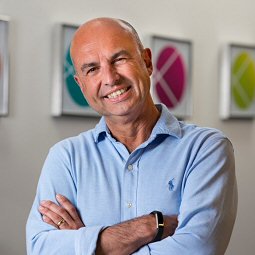Real Business #18 - Econokit
Real Business is a series of posts that analyses the marketing opportunities and challenges of real businesses in the South East. The interviews are undertaken by Keith Lewis of The Courier.
One of the many hazards facing any would-be inventor is that someone, somewhere unbeknown to you in the world is working on the same project and beats you to the market. That is precisely what happened to vehicle engineer Alan Cooper.
Having spent many months developing his own device for reducing air pollution and improving fuel economy in motor vehicles, he discovered that a firm in France had passed the winning post a few months before him with its Econokit system. “We had the idea, but they had the product”, said Mr Cooper.
Undaunted, he and his wife Debbie, who live in Halstead just outside Sevenoaks, decided to throw in their lot with the French firm to become sole distributor of Econokit in the UK. In the face of stiff competition from other, bigger rivals just as keen to exploit the product, it cost them their life savings to secure the franchise in this country for just one year.
They formed their own holding company last October through which they will market Econokit UK. Both currently work for the same engineering firm which has evidently given its full approval to the Cooper family’s new enterprise.
Whilst improving air pollution and improving fuel economy are both high on most people’s agenda in the current climate, the couple are facing some fundamental problems. Like any new device that promises such highly-prized benefits, potential purchasers of Econokit will be looking for proof that it works before they part with any cash (£300 for a car or £400 plus for a commercial vehicle). Or, if not actual proof, then at least some sort of formal endorsement from an authoritative, independent source that gives credence to the vendors’ claims.
Securing that endorsement not only takes money, it also takes time. For example, companies having to comply with the London Low Emission Zone regulations could stand to benefit enormously from Econokit - it would mean they could adapt older vehicles rather than bear the cost of replacing them. However, Mr Cooper pointed out “the approval criteria applied by Transport for London (TFL) require that applicants are at least two years old, have an established financial record and have attained ISO 9000 standard in the management of their business. We are unable currently to satisfy any of these and even if we could, the testing period before approval is forthcoming (assuming that Econokit passed the tests) could prove prohibitive".
It also seems that it would be far easier to demonstrate Econokit’s benefits to air pollution than to lower fuel consumption. Apparently, engines run so much more smoothly with the device that drivers are inclined to put their foot down and wipe out any savings in the process. So, the system is good for the green lobby, but less good for the pocket. Question: which benefit would be most valued by the purchaser?
Finally, anyone fitting any sort of modification to their vehicle needs to inform their insurer to make sure that their cover is not compromised in any way. Econokit is so new that every driver or fleet operator would be required to contact their insurer on an individual basis to secure approval.
The bottom line for Alan and Debbie Cooper is that the French manufacturer of Econokit is expecting the UK franchisee to sell 600 units per month. So far, Econokit UK has sold ten. It stands to reason that, unless the take-up improves dramatically, it could be tricky when renewal comes up after twelve months.
Aside from their legal position, marketing is obviously going to be crucial and, in that area at least, the Coopers have had a stroke of good fortune. Winning the recent Local Business Accelerators (LBA) contest, run by the Kent and Sussex Courier and the Sevenoaks Chronicle in association with the Newspaper Society, will entitle them to a free advertising campaign. The couple will also receive business help, advice and support from Peter Bull, owner of the Hop Farm in Paddock Wood, and mentoring from Dragon’ Den star Deborah Meaden.
The Marketing Eye says:
To invest one's life savings in a business without a crystal clear understanding of the target market, the barriers to entry and the fundamentals of the marketing strategy is bold to say the least. The advice to others is to do a full analysis BEFORE investing.
Given that the Coopers are fully committed to the business, they should re-examine the route to market and start to sell the units via garages and engine tuning specialists. The public will trust the expertise and endorsement of a specialist far more than they will claims in adverts and on a website.
The pricing structure makes it a better deal for the haulier than for the motorist. Consumers won't take the risk of invalidating their insurance or pushing the premium up, but hauliers will take a more commercial approach to it. If the efficiency saving is indeed >10%, the £400 cost could be recovered in a few tanks of fuel. Alan and Debbie need to focus on this sector and make the business case very clearly in their marketing.
Sadly, the business will never hit 600 units a month with advertising. A £2m turnover business is a serious enterprise that requires a professional approach to sales. The owners need to get out on the road and meet the haulage operators and garage owners face to face. Admittedly, difficult if the Coopers are trying to do it part time on their own.
A proven way to launch a new product is to seed free samples into the market to get people using it and talking about it. Which leads me to ask, what marketing support is the franchisor giving?
The franchisor should be driving the conversation about fuel prices and the environment, providing the free samples, the case studies and proof of concept - and, indeed, even helping to secure the TfL endorsement. I can't see any evidence of this, which might give some basis for recourse.
The mentors have definitely got their work cut out.
Have the owners bitten off more than they can chew? What would you advise?

Author
Neil Edwards
Neil is a Chartered Marketer and Fellow of the Chartered Institute of Marketing with many years' experience in marketing, brand and communications.
CEO / The Marketing Eye
Related Reading

Blog: Time to change the AltFi value proposition
by Neil Edwards, 4 minute read

Blog: Our New Site: Speed Improvements
by Jason Dilworth, 2 minute read